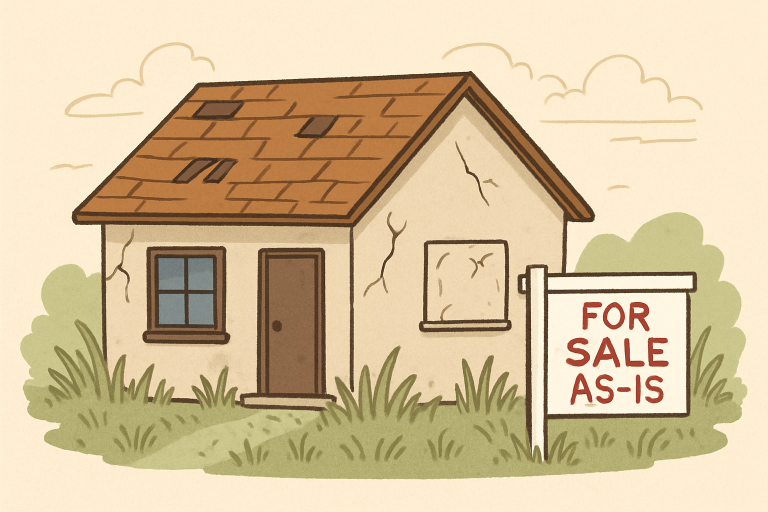Table of Contents
- Introduction
- What Does Selling As-Is Mean?
- Pros of Selling As-Is
- Cons of Selling As-Is
- Legal and Disclosure Requirements
- Market Conditions and Their Impact
- Tips for Selling a House As-Is
Selling a home as-is has become an increasingly popular option for homeowners who want to avoid the hassle and expense of repairs or upgrades. Whether you’re facing financial constraints, relocation, or simply want a fast, straightforward transaction, understanding the true implications of an as-is sale is essential. Many property owners in the area turn to companies that buy houses for cash in Lebanon to streamline the process and access a pool of ready buyers eager for investment opportunities.
This approach can present unique benefits and challenges. Homeowners looking for immediate solutions or quick exits often find selling as-is practical and efficient. However, critical factors to weigh—from legal liabilities to shifting market conditions—will impact your net result and peace of mind.
What Does Selling As-Is Mean?
Selling a house as-is means listing the property in its current state and making it clear to buyers that you will not be making repairs or improvements. Buyers agree to purchase the home with all its flaws—cosmetic, structural, or mechanical—knowing the responsibility for any updates or fixes falls squarely on their shoulders. This transparency can make the selling process smoother for sellers who don’t have the time, resources, or interest in tackling repairs. The phrase “as-is” is often a signal to serious buyers, such as those who focus on buying properties for cash and are ready to close fast.

Pros of Selling As-Is
Quick Sale Process
The most significant advantage for many sellers is speed. When you sell as-is, the path from listing to closing is often much faster—there’s no need to spend weeks or months addressing repairs, coordinating with contractors, or waiting for work to be completed. The prospect of an expedited process appeals greatly to homeowners facing time-sensitive situations such as financial distress or an urgent need to relocate. For those who want to sell your home fast, selling as-is can be a straightforward solution.
Cost Savings on Repairs
Not having to invest money in repairing or upgrading the house before selling can save thousands of dollars. If the property has aging systems or extensive deferred maintenance, as-is sales can relieve a tremendous financial burden. This is especially helpful for inherited homes or cases where the sellers lack the resources to make improvements.
Attracting Investors and Cash Buyers
Homes listed as-is naturally attract investors, cash buyers, and flippers—parties who expect to buy properties below market value, renovate, and resell or rent them. These buyers often have the capital and know-how to handle repairs efficiently, and they are less likely to be deterred by inspection results or appraisals, leading to smoother transactions.
Cons of Selling As-Is
Lower Sale Price
One notable drawback is a potentially lower sale price. Buyers will consider the cost of necessary renovations and typically expect a discount to reflect the property’s condition. As a rule, homes sold as-is don’t match the prices of move-in-ready properties in the same neighborhood.
Limited Buyer Pool
Conventional buyers—especially those relying on funding from traditional lenders—may pass on as-is listings because lenders often require certain conditions to be met before approving a mortgage. Selling as-is tends to limit your audience primarily to investors, cash buyers, and bargain hunters.
Potential Legal Issues
Even when selling as-is, homeowners must adhere to state and federal disclosure laws. Failing to reveal known problems, such as foundation cracks or mold issues, can lead to post-sale legal disputes. Full transparency protects both parties and helps establish trust in the transaction.
Legal and Disclosure Requirements
Transparency is non-negotiable, even with an as-is listing. Sellers must provide buyers with full disclosure about known defects—such as roof leaks, termite damage, or safety hazards. Laws vary by state, but sellers are generally required to complete a formal disclosure form. Being upfront helps avoid costly and stressful legal issues after closing and reassures buyers of your integrity.
Market Conditions and Their Impact
The local real estate landscape plays an influential role in your as-is sale. In a hot seller’s market, where buyer demand outpaces inventory, you may attract multiple offers even with an as-is property—sometimes receiving more than you expect. In a slower, buyer-driven market, expect fewer interested buyers and potentially longer listing times with steeper price adjustments.
Tips for Selling a House As-Is
- Set a Realistic Price: Study similar as-is sales in your area or hire an appraiser. Competitive pricing is critical to attracting genuine offers from buyers looking for deals.
- Highlight Positive Features: Emphasize features such as location, lot size, or unique architectural details that can help overshadow the home’s flaws in your marketing materials.
- Be Transparent: List known issues in detail and stress your willingness to communicate openly. Documentation and honesty can make buyers more comfortable.
- Market to the Right Buyers: Target audiences interested in fixer-uppers, investment properties, and renovation projects through relevant online platforms, local ads, or agent connections.
- Maintain Cleanliness: Even without making repairs, keeping the house clean and tidy can significantly impact first impressions and buyer interest.
Making a decision to sell your home as-is comes down to your priorities, finances, and desired timeline. Weighing the pros and cons, understanding your obligations, and effectively marketing your property will help you achieve the best possible outcome in your unique situation

